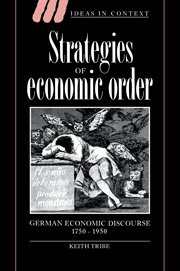Book contents
- Frontmatter
- Contents
- Acknowledgements
- 1 Introduction: From Cameralism to Ordoliberalism
- 2 Cameralism and the science of government
- 3 Die Vernunft des List. National economy and the critique of cosmopolitan economy
- 4 Historical Economics, the Methodenstreit, and the economics of Max Weber
- 5 The Handelshochschulen and the formation of Betriebswirtschaftslehre, 1898–1925
- 6 The Logical Structure of the Economic World – the rationalist economics of Otto Neurath
- 7 Capitalism, totalitarianism and the legal order of National Socialism
- 8 The genealogy of the Social Market Economy: 1937–48
- 9 The New Economic Order and European economic integration
- Bibliography
- Index
- Ideas in Context
6 - The Logical Structure of the Economic World – the rationalist economics of Otto Neurath
Published online by Cambridge University Press: 14 September 2009
- Frontmatter
- Contents
- Acknowledgements
- 1 Introduction: From Cameralism to Ordoliberalism
- 2 Cameralism and the science of government
- 3 Die Vernunft des List. National economy and the critique of cosmopolitan economy
- 4 Historical Economics, the Methodenstreit, and the economics of Max Weber
- 5 The Handelshochschulen and the formation of Betriebswirtschaftslehre, 1898–1925
- 6 The Logical Structure of the Economic World – the rationalist economics of Otto Neurath
- 7 Capitalism, totalitarianism and the legal order of National Socialism
- 8 The genealogy of the Social Market Economy: 1937–48
- 9 The New Economic Order and European economic integration
- Bibliography
- Index
- Ideas in Context
Summary
I agree with your view that the previous form of free economy … will not return, or if it does then heavily modified by financial or exchange considerations – not for any other. I will not shed a tear for if it should so turn out. But I judge the matter in a manner similar to Eulenburg … and regard plans for a ‘planned economy’ as dilettantish, objectively as absolutely irresponsible recklessness of a kind that can discredit ‘socialism’ for a hundred years, and which will draw everything that might be realised now into the depths of crass reaction. That is what I unfortunately see coming, and here lies the difference between us. I fear that you contribute to the increase of this danger, which you massively underestimate.
The World War of 1914–18 brought to a definite end the ‘long’ nineteenth century and inaugurated the age of modernity. Many who recognised this also assumed that nineteenth-century capitalism would be replaced by a new form of twentieth-century, planned economy; that the correlate of the modern world was an organised economy in which rational deliberation would replace profit and the market as the mechanism for the allocation of resources. The Russian Revolution was but the most advanced form of this development; radicals and socialists everywhere looked forward eagerly to the new world that was opening up, a world of social, political, and economic change in which the old constellation offerees no longer prevailed.
- Type
- Chapter
- Information
- Strategies of Economic OrderGerman Economic Discourse, 1750–1950, pp. 140 - 168Publisher: Cambridge University PressPrint publication year: 1995



